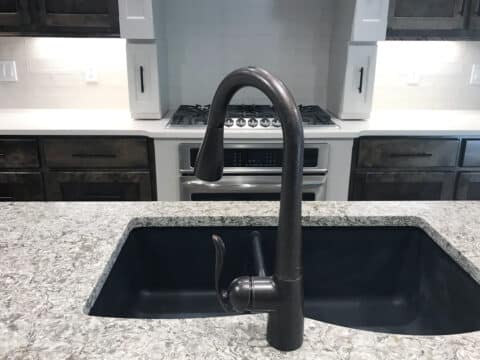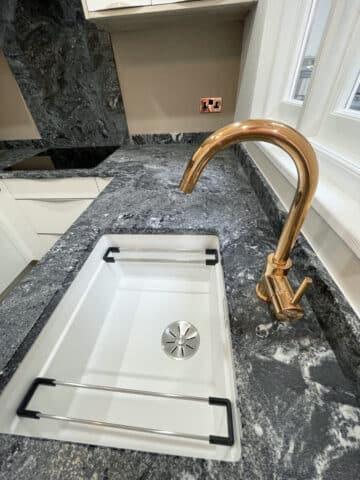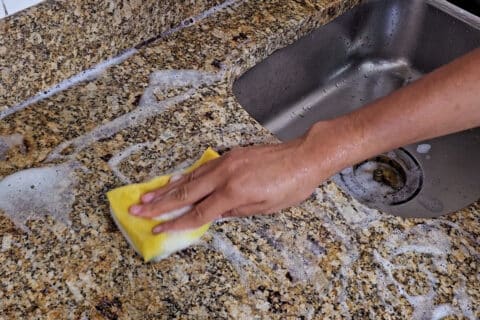What Is the Difference Between Quartz vs Quartzite Countertops?
Quartz and quartzite countertops are rising in popularity due to their aesthetic appeal and unique characteristics. Each of these stone materials have advantages and traits that homeowners look for when deciding on a countertop surface.
Quartz and quartzite might be confused with one another; however, the two materials have significant differences. One of these is their composition. Quartz is an engineered stone made from combining minerals with resin, whereas quartzite is a natural mineral quarried from mountains. Their composition greatly contributes to their differences, and it’s important to understand the advantages of each material to make an informed decision in your home remodeling project.
Some of the key differences between quartz and quartzite countertops include:
- Composition and Formation
- Physical Properties and Durability
- Aesthetics and Appearance
- Cost
- Maintenance
Composition and Formation
Quartz Countertops
 Quartz is an engineered stone material. This means it is manufactured into slabs by combining natural quartz crystals with resin and pigments. The slabs can be manipulated to resemble natural stone materials such as marble, soapstone or concrete.
Quartz is an engineered stone material. This means it is manufactured into slabs by combining natural quartz crystals with resin and pigments. The slabs can be manipulated to resemble natural stone materials such as marble, soapstone or concrete.
The manufacturing of quartz allows for design consistency and as a result, multiple slabs to be produced in the same design. This gives the advantage for customization and the ability to find a slab in the exact color and pattern you have envisioned.
Quartzite Countertops
Quartzite is a metamorphic rock that is formed from sandstone by pressurized heat and tectonic movement within the Earth. It is mined and quarried into slabs to be used for multiple uses, including countertop installation. Natural stones such as quartzite produce unique slabs that cannot be replicated or reproduced, so no two slabs are alike.
Physical Properties and Durability
Quartz Countertops
Quartz has become a popular countertop material because it offers qualities that natural stones can’t. It is a highly durable and premium hard surface. Since quartz is an engineered stone, it is non porous and therefore, it’s able to repel liquids and bacteria. Liquids are unable to seep through the surface, eliminating the risk of stains and etching.
Quartz is a durable material that can be used in high-traffic areas, including kitchens and bathrooms. Its physical properties make it ideal for any space, and its ability to resemble other stones makes it suitable for every aesthetic.
Quartzite Countertops
Quartzite is a hard and durable stone that offers attractive properties. Quartzite is not entirely scratch or stain resistant, but its natural hardness and innate characteristics allow it to have high heat tolerance. A unique property of quartzite is that it is UV-resistant and can be used for outdoor applications.
The physical properties and durability of quartzite make it a great option for your home remodel. In general, slabs come in light and neutral tones that are timeless and appealing.
Aesthetics and Appearance
Quartz Countertops
 Quartz is a versatile material that can be manufactured to resemble any natural stone material without natural stone maintenance. With quartz countertops, you can get the look of marble without the maintenance issues associated with marble.
Quartz is a versatile material that can be manufactured to resemble any natural stone material without natural stone maintenance. With quartz countertops, you can get the look of marble without the maintenance issues associated with marble.
Quartz comes in an array of colors, patterns and designs that complement all design styles. Manufacturers are able to control the formation process to achieve a desired look. As quartz becomes more common, more slabs are produced creating a bigger selection for you to choose from. This countertop option meets all criteria in terms of looks and performance.
Quartzite Countertops
Due to quartzite’s natural formation process, each slab varies with unique patterns and veining. Quartzite slabs generally have light, earthy tones and limited color options compared to quartz. However, quartzite remains a sought out option because its neutral colors are high in demand and align with current design trends.
If you’re looking for a durable yet distinctive stone countertop, quartzite is the perfect option.
Cost Considerations
Quartz Countertops
Quartz countertops are considered to be a cost-effective option because they are durable and versatile. Appropriate care and maintenance can prolong the lifespan of your quartz countertop, helping you save money in the long run. Prices can depend on the brand, availability and demand, as well as installation costs.
Quartzite Countertops
Quartzite countertops tend to be more expensive than quartz because of costs associated with quarrying as well as factors such as the particular slab’s origin, rarity and quality. Each quartzite slab is unique in its mineral makeup which contributes to the price of the slab. In addition, the extra maintenance required with natural stone can result in additional costs and should be considered when deciding between quartz and quartzite countertops.
Maintenance
Quartz Countertops
 Quartz is one of the most low-maintenance stone countertop materials. It is nonporous, scratch and stain resistant, and has a high heat tolerance. It is suitable for all spaces, including high-traffic areas such as kitchens and bathrooms because of its durability and easy upkeep.
Quartz is one of the most low-maintenance stone countertop materials. It is nonporous, scratch and stain resistant, and has a high heat tolerance. It is suitable for all spaces, including high-traffic areas such as kitchens and bathrooms because of its durability and easy upkeep.
Engineered stones such as quartz do not require sealings because it is able to repel liquids and bacteria as a nonporous material. This makes quartz a highly hygienic surface. It can be easily cleaned with a mild soap and water. Quartz is an appealing countertop surface to many homeowners because it is relatively hassle-free.
Quartzite Countertops
In terms of maintenance, quartzite countertops require considerations that quartz does not. Installation for natural stone should be carefully considered because it requires additional maintenance. Depending on your expectations, quartzite may or may not be suitable for your space. Daily and long-term maintenance is necessary for your quartzite countertops relative to their use.
Natural stones such as quartzite require routine sealings to preserve their natural beauty and longevity. Perhaps one of the biggest drawbacks to natural stone countertops is their porosity. Natural stones have pores and crevices that can be vulnerable to liquids, causing staining or etching if not properly sealed.
Long-term maintenance such as routine sealings are essential for quartzite countertops. A sealant acts as a protectant barrier to seal pores and helps prevent stains, etches or scratches from occurring. Daily maintenance such as wiping debris from countertops and immediate clean-up after spills will keep your countertops free of damage.
Decision-Making Guidance
Understanding the differences between quartz and quartzite countertops will help you make an informed decision. Factors you should consider when choosing between quartz and quartzite countertops include composition, physical characteristics and durability, design aesthetic, cost, and maintenance.
When deciding between quartz and quartzite countertops, you should consider their differences and match the material that is most suitable to your specific needs, design preferences and lifestyle.
Choose Granite and Marble Designs for your Quartz and Quartzite Countertop Installation
Granite and Marble Designs can help you with your decision-making process when choosing between quartz and quartzite countertops. We will work to understand your preferences and expectations so that you can make the most informed and educated decision. Our stone design consultants are experts in helping our customers articulate a cohesive design and recommending the best countertop option.
We work with all of the best suppliers to help you find the right slab for your remodel project. Our showroom brings all of the quartz options to you so that you can compare brands side by side.
Contact Granite and Marble Designs to have your quartz or quartzite slab ordered, fabricated and installed by our team.
